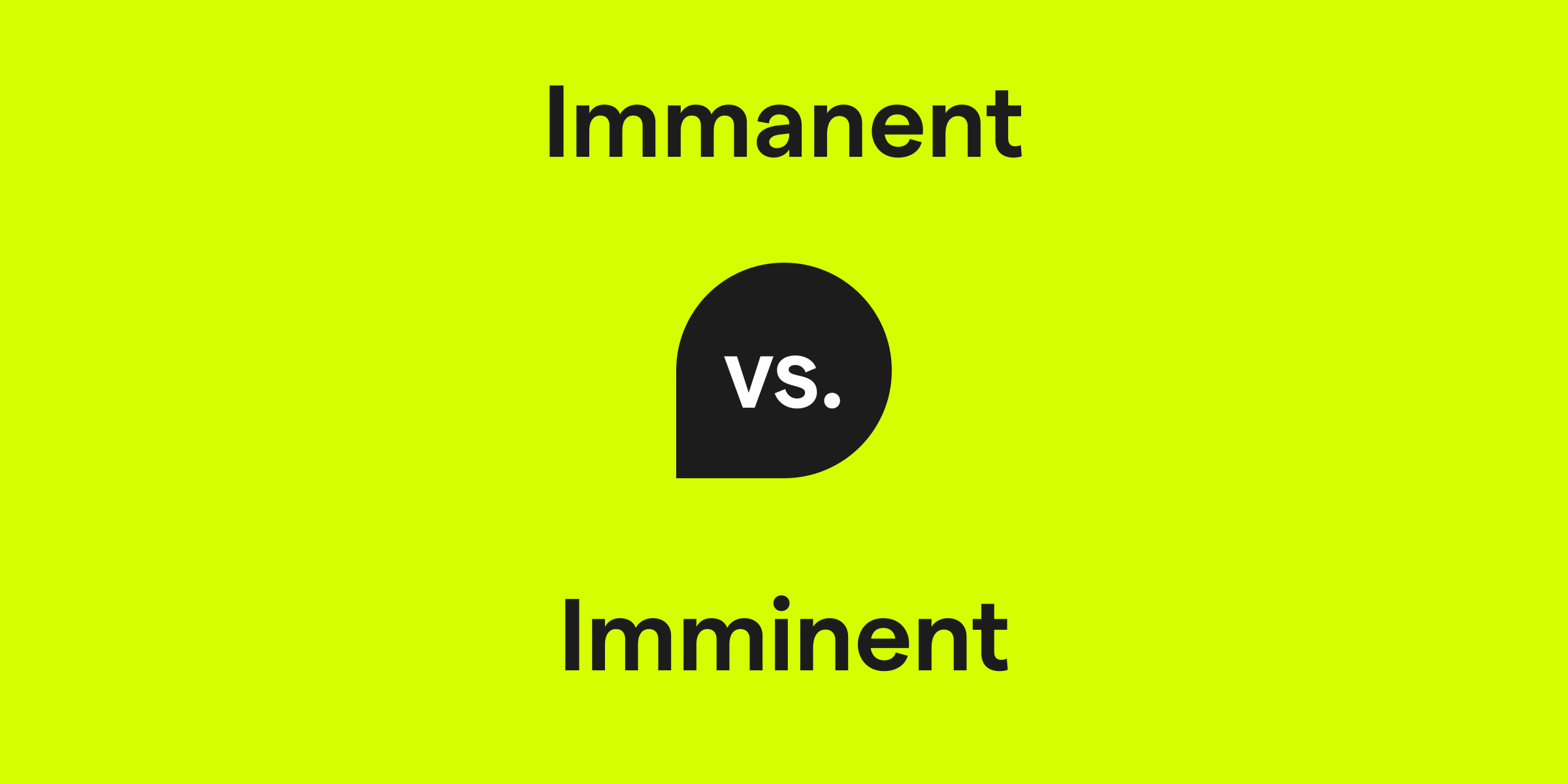Immanent vs. Imminent: What's the Difference?
The words immanent and imminent may sound similar, but they describe entirely different concepts. Immanent is an adjective that refers to something inherent or existing within; it is often used in philosophical and religious contexts. In contrast, imminent, also an adjective, describes something about to happen or looming on the horizon, typically used in everyday language to indicate impending events.

How do you use the word immanent in a sentence?
The word immanent is often used to describe an inherent quality or presence within something. It's particularly relevant in discussions that pertain to spirituality or natural characteristics that are seen as a fundamental part of the existence of beings or systems. Philosophers may use immanent to depict a permanent, intrinsic, or necessary aspect of life or the universe.
Examples of immanent in a sentence
- Many ancient philosophers contended that gods are an immanent part of the natural world.
- The struggle for existence is immanent in the survival of every species.
- In her music, one can feel an immanent joy that seems to spring from creativity itself.
How do you use the word imminent in a sentence?
Use the word imminent when you want to convey that an event or occurrence is about to happen very soon. It typically carries a sense of urgency or a warning about forthcoming events ranging from weather conditions to outcomes of actions. When you signal that something is imminent, you're suggesting it's just around the corner; whether it's good or bad news.
Examples of imminent in a sentence
- Meteorologists warned that an imminent storm was rapidly approaching the coast.
- Due to escalating tensions, diplomats anticipated an imminent outbreak of hostilities.
- With the deadline imminent, the team worked feverishly to complete the project.
Immanent and imminent definition, parts of speech, and pronunciation
Immanent definition:
Immanent is an adjective that means naturally part of something; inherent or omnipresent. It is particularly used to express the presence of divine power in the material world.
Immanent parts of speech:
Immanent pronunciation:
Immanent is pronounced as /ˈɪmənənt/, with the stress on the first syllable and the 'a' pronounced like the 'a' in 'ant'.
Imminent definition:
Imminent is an adjective used to describe something that is about to happen, particularly an event that is impending or looming in the very near future.
Imminent parts of speech:
Imminent pronunciation:
Imminent is pronounced as /ˈɪmɪnənt/, with the stress on the first syllable and the 'i' pronounced like the 'i' in 'in'.
Immanent is an adjective that means naturally part of something; inherent or omnipresent. It is particularly used to express the presence of divine power in the material world.
Immanent parts of speech:
- As an adjective, immanent can apply to qualities and conditions. For example: 'There's an immanent beauty in every act of kindness.'
Immanent pronunciation:
Immanent is pronounced as /ˈɪmənənt/, with the stress on the first syllable and the 'a' pronounced like the 'a' in 'ant'.
Imminent definition:
Imminent is an adjective used to describe something that is about to happen, particularly an event that is impending or looming in the very near future.
Imminent parts of speech:
- As an adjective, imminent often precedes nouns related to events or actions. For instance: 'The CEO's resignation appears to be imminent, given recent pressure and criticism.'
Imminent pronunciation:
Imminent is pronounced as /ˈɪmɪnənt/, with the stress on the first syllable and the 'i' pronounced like the 'i' in 'in'.
Immanent vs. imminent in a nutshell
Immanent and imminent are two adjectives that often cause confusion due to their similar pronunciation. Immanent reflects internal and inherent qualities, suggesting a presence within. Imminent, on the other hand, means something is about to take place, often hinting at an urgency or upcoming change. Both words fulfill distinct descriptive roles and are valuable in their respective contexts for expressing inherent characteristics or anticipating events.
Get AI Writing Assistance Wherever You Type
Make sure your vocabulary is on point and every punctuation mark is in the right place, no matter where you’re working. Grammarly works across more than 1 million websites and apps so you can improve your writing without copying, pasting, or breaking focus.

More Commonly Confused Words
Interest piqued? Pore (not pour) over other commonly confused words to help your writing reach peak (not peek) performance.